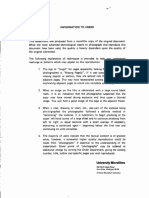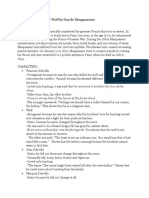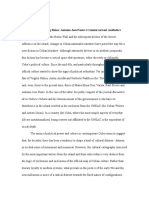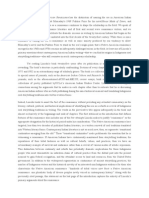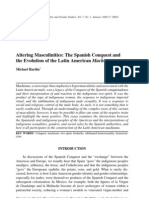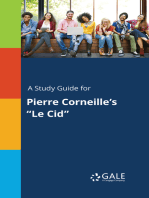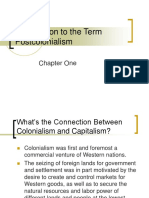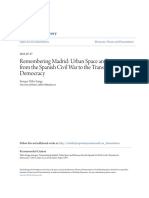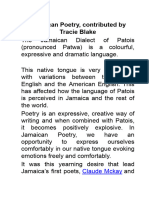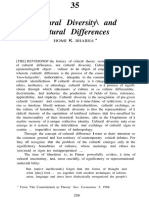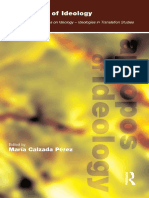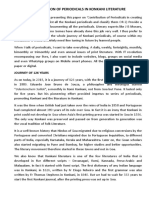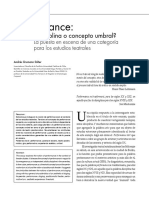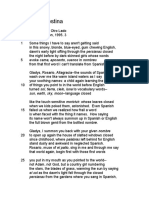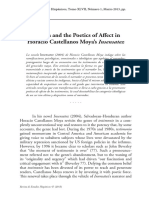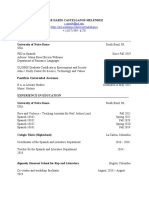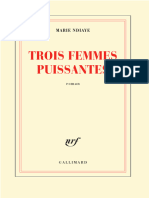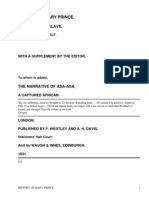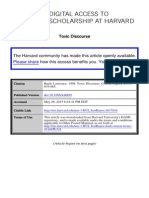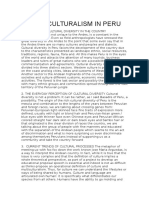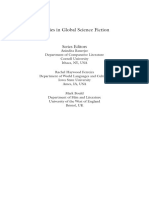Desirada A New Conception of Identity An Interview With Maryse Condé
Desirada A New Conception of Identity An Interview With Maryse Condé
Uploaded by
Pubg BolteCopyright:
Available Formats
Desirada A New Conception of Identity An Interview With Maryse Condé
Desirada A New Conception of Identity An Interview With Maryse Condé
Uploaded by
Pubg BolteOriginal Description:
Original Title
Copyright
Available Formats
Share this document
Did you find this document useful?
Is this content inappropriate?
Copyright:
Available Formats
Desirada A New Conception of Identity An Interview With Maryse Condé
Desirada A New Conception of Identity An Interview With Maryse Condé
Uploaded by
Pubg BolteCopyright:
Available Formats
Desirada: A New Conception of Identity: An Interview with Maryse Condé
Author(s): Maryse Condé and Robert H. McCormick Jr.
Source: World Literature Today , Summer, 2000, Vol. 74, No. 3 (Summer, 2000), pp. 519-
528
Published by: Board of Regents of the University of Oklahoma
Stable URL: https://www.jstor.org/stable/40155819
JSTOR is a not-for-profit service that helps scholars, researchers, and students discover, use, and build upon a wide
range of content in a trusted digital archive. We use information technology and tools to increase productivity and
facilitate new forms of scholarship. For more information about JSTOR, please contact support@jstor.org.
Your use of the JSTOR archive indicates your acceptance of the Terms & Conditions of Use, available at
https://about.jstor.org/terms
is collaborating with JSTOR to digitize, preserve and extend access to World Literature Today
This content downloaded from
104.211.220.240 on Wed, 01 Feb 2023 19:03:49 UTC
All use subject to https://about.jstor.org/terms
A New Conception
of Identity
AN INTERVIEW WITH MARYSE CONDE
ROBERT H. McCORMICK JR.
The following interview with Maryse Conde (MC) took place on 12 June
1999 at the author's home in Montebello, Guadeloupe. The interview
was recorded, transcribed, edited, annotated, and translated from French
into English by Robert H. McCormick Jr. (RM).
rm: I would like to focus, at the beginning, on your
most recent novel, Desirada [1999]. My first set of ques-
tions relates to the origin of the novel. When did you Photo: Michael Britto
Maryse Conde, 1992
start thinking about writing what eventually became
Desirada?
Indian. Then someone says, "You are West Indian, but
mc: A long time ago, but I can't say exactly when.
you don't live in the West Indies. You don't speak Cre-
Generally, one works on two novels at the same time.
ole, or very little. By what criteria do you define your
Thus, while I was working on Windward Heights [1999;
West Indian-ness?" You see, I constantly have to justify
orig. La migration des cceurs, 1995], I was thinking about
my identity. Finally, one day, I came to the conclusion
Desirada. All together it took me about four years, but I
that I was going to stop justifying myself. Too bad for
can't say exactly when I started thinking about it.
everyone else! Perhaps we can say that I chose my
rm: Is Desirada a novel, an idea, that you have nur- identity and that I was going to stick by it. Marie-Noelle
tured for a long time? [in Desirada] doesn't know who her father is, and she
mc: It is the conclusion of a lot of thought, of continual doesn't know her own family history very well because
reflection on identity, origin, nationality, language. . . . there are a lot of gaps in it. Her mother gives her one
version. Her grandmother another. Everyone around
Yes, it is the result of long periods of reflection. The
her lies. Thus, she finally says to herself, "It doesn't
actual writing of the book, however, took three or
matter. I am going to live as I am." I think that one has
four years.
to define one's identity personally without worrying
rm: What was the original impulse behind the novel? too much about other people.
Was there a particular incident or idea that pushed you
to write the novel?
rm: I am pleased to hear your answer because that is
more or less how I interpreted the novel. You dedicat-
mc: The specific problem is that one always asks me, ed this novel to your daughters, didn't you?
a West Indian, the question " Where are you from?" as
mc: My daughters? Perhaps. I can't remember exactly.
if to say "Define yourself!" Since I am black, people
want me to emphasize Africa. I was in Africa, though, rm: I was going to ask you why.
and I realized that race is less important than culture. I mc: Perhaps . . . it's because there are many mother-
cannot say that I am African. I must say I am West daughter relationships in the book and because my
WORLD LITERATURE TODAY « 74:3 « SUMMER 2000 • 519
This content downloaded from
104.211.220.240 on Wed, 01 Feb 2023 19:03:49 UTC
All use subject to https://about.jstor.org/terms
daughters also have daughters. . . . Everyone knows that rm: Fiorella!
mother-daughter relationships are very complicated. mc: Yes, everyone! And poor Marie-Noelle, who only
rm: I would like to ask you a few questions about the wants to know the answer to some simple questions -
structure of Desirada. It's a ternary structure that repre- Who is my father? Who am I? What happened? - won't
sents three generations, isn't it? ever find out. Because everyone lies. Not in a conscious
and malicious way. Because, ultimately, to tell a story
mc: Yes. There are three generations of women: the
is to embellish it, to fabricate it according to one's tastes
grandmother who almost never left Desirada and who
and desires, to create fiction.
returns to die there, the mother who left for France and
who represents the first form of emigration, and her rm: But Reynalda, for example, Marie-Noelle's mother,
daughter who ultimately arrives in Boston. I didn't doesn't have a recit. Only Nina and Ludovic. When, in
want those three narratives to be in chronological your writing, do you say to yourself, "Aha! Now, I need
order whereby one begins with the grandmother, then a recit"?
the mother, and then . . . No. I wanted to deconstruct.
mc: When I want to interrupt, deconstruct, my narra-
The novel begins with the birth of the granddaughter. tive by introducing another voice. To create a sort of
Thus, we start at the end and, gradually, discover the polyphony, I introduce a voice which is not the narra-
grandmother, the third generation. One must decon- tor's voice, a voice that subverts the narrative that the
struct linear structure. There should be some fantasy in author, Maryse Conde, is presenting. The recits and
the construction. The women, the three panels of the the voices are there to create a sort of contradictory
triptych, correspond to three ways of being West Indian, polyphony so that the reader can form his own opinion.
Guadeloupean. I don't think the author, the narrator, should always
rm: Thus, there are three generations, but they don't provide the definitive version.
really correspond exactly to the three parts of the novel. rm: Thus, it would be an error to interpret those re-
mc: Right. cits as being closer to reality, to Truth, than the other
voices.
rm: There are three "media" too - i.e., three women
in touch with the imaginary world. There is Madame mc: Yes, because they, too, are very subjective. A
Esmondas in Boston . . . recit is the presentation of a version of a life history.
mc: Yes.
Not every one is a manifestation of Truth. It's just
another version.
rm: That's not a reiteration of the ternary structure?
rm: A recit, then, is simply another voice, another
In each venue where Marie-Noelle lives, there is a
point of view, in a different - i.e., first-person - nar-
woman allegedly in contact with the "other" world.
rative form.
Each one mysteriously disappears without a trace,
mc: A variation.
without saying anything to Marie-Noelle.
mc: Not really. They represent memories of rm: I also
people I wanted to ask you a couple of autobio-
graphical questions if I could. Where was your mother
knew. When one writes an intimate novel, memories
born?
resurface, people and even events that one wants to in-
mc: She was born on the island of Marie-Galante.
clude somewhere, but there is no particular significance.
rm: There were three of them. I thought that
rm:perhaps
Could you please be a bit more precise?
you were subtly trying to echo your tripartite mc:
structure.
A La Treille.
. . . Generally, what is the function of a "recit" in your
rm:Nina
novels? In Desirada there are two recits: one by Yes, Mrs. Therese Tyrolien was kind enough to
and the other by Ludovic. pass that information along to me. I have read that you
have great admiration for Guy Tyrolien.
mc: I wanted to show that there is no Truth. Every-
mc: Yes.
one recounts his/her life, life history, differently. It is
rm:
not possible to find an objective reality basing He wrote some very pertinent remarks about
one's
your
judgments solely on the words of others. Nina early works. . . . And your grandmother? Where
relates
wastoo.
events her way. Ludovic in his way. Reynalda she born?
520 WORLD LITERATURE TODAY 74:3 SUMMER 2000
This content downloaded from
104.211.220.240 on Wed, 01 Feb 2023 19:03:49 UTC
All use subject to https://about.jstor.org/terms
mc: I believe she was born in Marie-Galante also. essentially the reggae of Bob Marley. If you talk to
West Indians about other forms of European or West-
rm: When did your mother die?
ern music, they will refuse to accept them. They are
mc: That must have been in the 1950s.1
not familiar with them, but reject them nonetheless.
rm: Out of curiosity, did you frequently go to We need to open ourselves up to new forms of music
Desirada2 when you were young? no matter where they come from. Bob Marley is not
the only one capable of creating music we can call
mc: No, never. I only went when I had finished the
book. "Caribbean." We must accept the fact that people can
produce music that differs radically from the music of
rm: Really? That's interesting.
the gods venerated by tradition. For example, now in
mc: I wrote the novel based on travel books. The book Guadeloupe, there is only "Kassav." O.K, but other
by Lasserre3 gives a good description of Guadeloupe musicians can produce other types of music equally
and its surrounding islands. Afterwards, I went there.significant. We have to stop being narrow-mindedly
nationalistic, exaggeratedly patriotic.
rm: Shifting away from the relation of fact to fiction, I
wanted to ask a few questions about the role of musicrm: I didn't understand whether there was a hint of
in Desirada. What is Stanley's role in the novel? Is he irony
a in use of the title "The Symphony of the New
musical genius, but a failure in his private life? World," but ...
mc: I personally consider him a genius. He is some- mc: No, the title is not ironic. In fact, it's a tribute to
Dvorak, a musician I like very much.
one who has, with his M.N.A., "Music of the New Age/'
a broad, panoramic vision of West Indian culture. Herm: Stanley becomes then the source of certain ideas
wanted to create a harmony, or synthesis, that wouldabout migration and creativity, for example, that are
encompass all the musical forms of the Caribbean. Hedear to you, ideas you developed in your presentation,
was striving for a way to break with particularismes, "O Brave New World" (32), at the 1998 African Litera-
such as zouk. ture Association conference held in Austin, Texas.
rm: A sort of musical pan-Caribbeanism? mc: Yes, it is not at all ironic. On the contrary, Stanley
mc: Exactly. He's a genius, but a genius who isn't is a sort of spokesperson.
able to live.
rm: Who has the problem of adapting poorly to
rm: At times I was confused, but you do use the everyday life?
word genius in the text. I assume to make your positionmc: He doesn't know how to live. He's too interior.
clear. He's very introverted. Thus, he doesn't know how to
mc: Yes. communicate. He doesn't know how to get people to
accept, to appreciate, his ideas.
rm: After the failure of his group in the Dominican
rm: His
Republic, essentially because they are unknown, experience at the jazz festival in the Domini-
he has
can Republic is rather brutal. People went to his con-
many problems. And, toward the end, he becomes
rhetorical, repetitive. cert in Santo Domingo because they were expecting to
see another group. The one advertised! When Stanley's
mc: Bitter. Frustrated. He starts to drink, I believe.
ensemble arrives, the audience leaves en masse. It's the
rm: He has a life trajectory that . . . fear of every artist, I think.
mc: That declines. mc: Exactly. And it happens very often. You are there
rm: I was puzzled by the title of his symphony,when
'The people are waiting for someone else.
rm:
Symphony of the New World." Could you explain I would like, because it seems to me relevant to
that
title? There is, of course, the passage where he indicates
your comments about Stanley's music, to refer to
he wants to distance himself from Bob Marley. But
another novel of yours that greatly intrigues me:
when he speaks about Dvorak, no one understands him. Tree of Life [1992; orig. La vie scelerate, 1987].
namely,
Should we consider Stanley as representing values
mc: I wanted to say that here, in the West Indies,
antithetical to those of Gesner?
there is a tendency to have heroes once and for all.
West Indian music, especially Jamaican music, ismc: Gesner is much more local.
WORLD LITERATURE TODAY 74:3 SUMMER 2000 521
This content downloaded from
104.211.220.240 on Wed, 01 Feb 2023 19:03:49 UTC
All use subject to https://about.jstor.org/terms
rm: Exactly. legedly raped her although the reader doesn't know
for sure. In short, she had a very difficult and painful
mc: Gesner is Guadeloupe, and that's it!
past. Thus, she is a character who should be pitied
rm: Because he doesn't leave.
rather than condemned.
mc: He doesn't leave. He doesn't travel. He repre-
rm: Of course, at the beginning one sees Reynalda
sents popular, traditional music. Roots. Stanley, on the
from the point of view of Marie-Noelle, who suffers
other hand, is a visionary. He leaves Guadeloupe. He
and doesn't know exactly why. Then gradually . . .
listens to everything.
mc: One understands why Reynalda, too, is so miser-
rm: I saw the opposition, but I wasn't sure how to
able. There is one thing, however, that she can be
evaluate it. According to your explanation, Stanley is
blamed for. When she obtains a sort of literary success,
more important,
she abandons Ludovic. In that case, she is a woman
even though Ges-
ner is rooted in his who is only thinking about herself.
people. rm: Yes. After having listed all the positive things she
did - i.e., write two books, avoid, unlike her mother,
mc: Perhaps the
the submissive role of a domestic servant, et cetera -
shift corresponds
she becomes rather worldly. Like the bourgeois writer,
to my own evolu-
tion. When I was Elinor, in your short story "Three Women in Manhattan."
writing Tree of Life, mc: Yes. She does all the radio and television shows.
I thought the best She reads everywhere. In doing so, though, she is
thing was return- rejecting her interiority. She becomes . . . exterior.
ing to one's native
rm: She doesn't do anything to clarify things for her
country and set-
daughter. Once, Reynalda started to explain every-
tling in there. Ges-
thing to Marie-Noelle, but she stopped abruptly in the
ner knows the peo-
middle of her explanation.
ple of his country;
he speaks for mc: True. I don't think she is very interested in the
life of her daughter
them. Gradually,
though, I realized She's not a very positive character.
that this is not rm: Perhaps we could say, though, that she le
enough, that one has to go beyond this. way for Marie-Noelle. In her writing, for exam
rm: An orientation like Gesner's could be considered
mc: Yes, she opened the door for her daughte
a bit ...
as Marie-Noelle says, she closed it too. Marie-N
mc: Parochial! says, "I wanted love, but I didn't get any. I wan
erature, but my mother had already done it." T
rm: Yes. Perhaps we could shift our attention to Rey-
ultimately, Reynalda opens, and then closes, t
nalda, a key protagonist in Desirada and a rather am-
biguous one. I could almost say a "nega-positive"rm: I asked myself, though, if Reynalda didn'
female protagonist. ly succeed in constructing a new vision of hers
mc: Yes. her personality. Thus, once again, she does, in
sense, what Marie-Noelle will have to do at th
rm: On the one hand, she is a bad mother. She says
the novel.
so herself. On the other hand, one forgets that she her-
mc: Well, she did start from nothing. She has a lot of
self was the result of a rape and that she suffered so
energy! And she did in fact reconstruct herself.
much from her pregnancy that she tried to drown her-
rm:servant
self. She is the illegitimate child of a domestic Socially and psychologically.
who doesn't love her.
mc: Yes, she moves from wanting to commit suicide
mc: Right. She doesn't know who her father is. Theto wanting to write, to the act of wanting to express
man who is in love, one would suppose, with her, al-
what is inside of her. A nice progression.
522 » WORLD LITERATURE TODAY • 74:3 • SUMMER 2000
This content downloaded from
104.211.220.240 on Wed, 01 Feb 2023 19:03:49 UTC
All use subject to https://about.jstor.org/terms
rm: But Ludovic says that everything she writes will for her identity or for her nationality. She must be the
be a lie. only judge. The only opinion that can be important is
her own. She wants to be liberated from all the con-
mc: But everyone lies. Everyone!
structions others make of her. She doesn't want to
rm: Ludovic is an interesting character too. If one can
have to act in accordance with their expectations. She
talk about a new Caribbean woman, perhaps, it is not
wants to be free. That's very difficult, and it takes a lot
unjustified to talk about a new Caribbean man. Clear-
of time. Finally, just at the end of the novel, she begins
ly, Ludovic is the opposite of the traditional Caribbean
to articulate, hesitantly, a few words.
male as you have described him in other texts. For one,
he is not the biological father of Marie-Noelle. Nor doesrm: Yes, and she calls that her "cure" [guerison].
he leave after the birth of his children. mc: It is the beginning of her cure.
mc: No, he stays. rm: One senses she
rm: And even though he isn't the biological father, he'sis on the right track.
the one who wants Reynalda to bring her daughter mc: We hope. For
back to Paris. her sake.
mc: Right. He's the one who wants Marie-Noelle rm: I want to try to
brought back to Europe. understand if she
rm: Perhaps we can consider Ludovic as a sort of really isn't very
counter-father. different from your
other female protag-
mc: Yes, the opposite of the traditional father.
onists. She's not
rm: Exactly. Thus, the work you do on male and determined by geog-
female roles in this text is prodigious! From the begin-raphy, for example.
ning, one is so focused on the role of women that per-
mc: True, but she's
haps one overlooks the fact that Ludovic is the narra-
the same as the oth-
tive depiction of a new role for Caribbean men.
ers. She's the same
mc: Yes, his role in very important. as Veronica, the
rm: If we compare him to masculine protagonists in heroine in my first
some of your other novels, again we see how different novel, Heremakhonon.
he is. But perhaps what is most interesting for me is Marie-Noelle contin-
his metissage. He is a bit like Stanley in that he has a ues along the same path as Veronica, but Veronica
very broad cultural vision. stops after her failure in Africa. Veronica leaves -
mc: He is Haitian, and he is Cuban. He has traveled perhaps for France, but it really doesn't matter -
whereas Marie-Noelle continues along the same trajec-
throughout the world. He speaks many languages. He
is the image of what the West Indies will become. He tory. After all her deceptions and all the negative
is a sort of future projection of Stanley, of people who things that happen to her, Marie-Noelle finally reaches
don't have a nationality, who don't have a precise a point where she says, "O.K. That's enough! From
homeland or culture, who have a sort of general, globalnow on, I am going to live without worrying about the
culture, but who often don't have social roles commen- opinion others have of me. I am going to try to live for
surate with their vision. myself and in relation to myself." Ultimately, she is
not that different from the other heroines. She simply
rm: Yes, he's multilingual. He's an excellent example
pushes herself farther down the road of introspection.
of the knowledge and wisdom that come from travel,
from emigration rm: Yes, but Veronica is determined, somewhat, by
minute the novelistic trajectoryher
ofcountry of origin, by her
Marie-Noelle. I language, by her genes
too, of
would say she wants to find a way if I can put it
life, a that
way way.of liv-
ing, that isn't determined by others. Would
mc: Perhaps, but you agree?
Veronica doesn't really know who
she is. the
mc: She wants to be liberated from She knows her father,
opinions of she knows her country of
others. She doesn't want to have to answer to others origin, and she knows her language, but, nonetheless,
WORLD LITERATURE TODAY • 74:3 • SUMMER 2000 • 523
This content downloaded from
104.211.220.240 on Wed, 01 Feb 2023 19:03:49 UTC
All use subject to https://about.jstor.org/terms
the entire book demonstrates that she too is in search we talk a bit about the role of Garvey? He seems to
of her identity. Everyone is searching for his or her represent the anti-quest. Thus, his mode of being is
diametrically opposite to that of Marie-Noelle.
identity, but Marie-Noelle is the only one who finishes
her search and says to herself, "I am going to live in mc: The small child, the son.
harmony with myself without knowing the exact
rm: Yes. He's not at all interested in his past. In fact,
answers to all the questions that have been put to me."
he seems to consider himself European.
rm: By saying to herself, "No, I am not determined
mc: He is born far from the West Indies, and neither
by my country of origin. No, I am not determined by
his mother nor his father maintains any connection
the language I speak. No, I am not determined by . . ."
with the place of their origin. He is not familiar with it,
mc: "My social class." nor does he ever return. Many young people of the
rm: "By the genetic structure of my father." Thus, inWest
a Indies consider themselves Europeans. I know a
lot of them. I have discussed this with a fellow writer,
certain sense, we can say that she overcomes all those
so-called determinisms, that she rejects them. Caryl Phillips. He's from St. Kitts. He left the island
when he was three months old, and he grew up in
mc: Yes, she succeeds in overcoming them and in
England. He considers himself a European. Thus, it's
finding a definition of her own unique personality.
another problematic all together. It's not the problem
rm: Thus the importance of her trip to the United of insular identity.
States.
rm: Being here now, at the time of the elections for
mc: Exactly, because it is in the United States that she
the European parliament, I realize how difficult it
realizes that having a country is not that important,might be for people living in Guadeloupe to consider
having a language is not that important, having a spe-themselves European. It seems to give the question of
cific place of origin is not that important. identity, and the question of pan-Caribbeanism, an
rm: I saw a television program the other day on entirely new dimension. For me, it was strange seeing
adoption, or rather about women, as children, who Sarkosy, and other candidates in the election, walking
had been abandoned by their mothers. Years after theamong voters trying to convince them that they were
separation, many women still desperately wanted to Europeans when in fact, as we know, they were colo-
nized by Europeans. And their independence was
know who their mothers were. The adoption agencies,
on the other hand, defended their policy of never denied by Europeans. I remember asking myself if a
revealing the identity of a child's donor. Especially Caribbean Common Market wasn't more logical.
since those were the original conditions. I started ask-
mc: We tried that. We just didn't succeed.
ing myself if that desire wasn't the sociological equiv-
rm: A few last questions about Desirada. The word
alent of the problematic you are raising. The desire to
reve occurs quite frequently in your novel. Marie-
find out the identity of their parents was so strong that
Noelle, to give just one example, dreams of her birth.
some of the women interviewed were working together
Is dreaming more important in Desirada than in your
on the formulation of a law that would force the agen- other novels?
cies to reveal the identity of the donor. I found the
mc: It seems to me it's important in all my texts, isn't
discussion of that urge related directly to the problem-
it? Dreams are an extremely important dimension of
atic of your novel.
West Indian culture. Dreams always make us think.
mc: Yes, I agree. But I think now that many agenciesWhat do they mean? What are they telling us? I think
make information about the biological parents available.
that they are important in the other texts too.
rm: According to the program I saw, that wasn't the case.
rm: I want, perhaps erroneously, to link the word
mc: It depends on the country. primarily to Marie-Noelle, to what she must do at the
end: i.e., re-imagine herself, re-create her life. I found it
rm: This particular program was about French
women. In the United States . . . fascinating how she tries to imagine the life of her
mother in Paris. It is also interesting stylistically
mc: I think they have the right to know. In England too.
because, as she narrates, one starts to think that it's the
rm: Before we finish our discussion of Desirada, could
narrator speaking . . .
524 WORLD LITERATURE TODAY 74:3 SUMMER 2000
This content downloaded from
104.211.220.240 on Wed, 01 Feb 2023 19:03:49 UTC
All use subject to https://about.jstor.org/terms
mc: And not her! related to her evolution. And, of course, to some of her
problems! Nonetheless, it is an important component
rm: Yes, there is that intriguing slippage in point of
of her self-expression. In Desirada, on the other hand,
view. In any case, I was thinking that it is precisely this
sexuality is ...
capacity to dream, to reconstruct imaginatively, that
allows her to go beyond what she is. mc: It's anguish and confusion!
rm: I would like to move now to your most recent
mc: It's a sort of constant in my novels. The capacity
text,
and the need to dream have an important function in Le cceur a rire et a pleurer: Contes vrais de mon
life, and it seems to me that they are not uniqueenfance,
to one that just came out this year [1999]. What
Marie-Noelle. was the original impulse behind this text?
mc: Essentially, it represents my response to the loss
rm: To me, it seems significant that Marie-Noelle is
of a son who died recently. To be honest, we were not
the one who dreams in your novel. I don't believe, for
example, that Ludovic dreams. He even says, on a very close. In fact, the relationship between us was
slightly different level, that the " American dream" always
is somewhat strained. Perhaps partly because of
dead. In fact, the novel demonstrates that it is very me. Nonetheless, or
much alive. Garvey . . . perhaps because of
that, his death was
mc: No, he doesn't dream either. Reynalda dreams
traumatic for me.
because she writes.
rm: Approximate-
rm: Yes, that is what I was trying to get at. The Last of
ly how old was
the African Kings [1997; orig. Les derniers rois mages,
your son when he
1992] begins with Spero's dream, but the capacity to
died?
dream, in Desirada in any case, seems limited to the
mc: Around forty.
female characters. ... I was always intrigued by the
title of a play by Calderon de la Barca . . . rm: And so the
mc: Life Is a Dream. text was a sort of
response . . .
rm: Yes. The title, polyvalent to be sure, seems to
mc: Of therapy.
indicate that dreams create life. By dreaming, conceiv-
ing of oneself differently, one can construct a reality
rm: How would
greater than . . . you say this loss
mc: Prosaic reality. affected your writ-
ing?
rm: By the way, is the English translation of Desirada
coming out soon? mc: I stopped
mc: It should be out in November 2000. writing fiction for
a long time. For almost a year.
rm: A final observation about the role of sexuality in
rm: And now?
Desirada. In this novel you portray, it seems to me,
sexuality without sensuality. That is not really new
mc:inI am writing again.
your novels. I am thinking of Thecla in Tree of Life, to
rm: The title of your text is taken from a song, isn't it?
cite only one example. It is frequently the case in Segu
too. I am going to translate one sentence from the mc: Yes, an old, very well known, popular French
song called "A la claire fontaine."
French as an example: " After Terri's departure, Stanley
took over again his place in Marie-Noelle's bed" (148).
rm: I found the subtitle intriguing. There is an inten-
We have here a simple changing of the guard; it istional ambiguity in the words "contes vrais," isn't there?
banal and without affection.
mc: When you try to tell the truth about your life,
mc: Yes.
you realize immediately that your truth is fiction and
that you
rm: In this regard, I would say it is rather unlike cer- are fabricating a reality, a somewhat imagi-
tain of your other novels. I am thinking of I, nary life. Nonetheless, the desire to be autobiographical
Tituba,
was real.
Black Witch of Salem. In that novel, Tituba's sexuality is
WORLD LITERATURE TODAY 74:3 SUMMER 2000 525
This content downloaded from
104.211.220.240 on Wed, 01 Feb 2023 19:03:49 UTC
All use subject to https://about.jstor.org/terms
rm: Is this the first text where you speak autobiograph- himself "Sandrino" to appear more American.
ically of your youth?
mc: My brother.4
mc: Yes.
rm: Who wrote too. I found it interesting that you
rm: But couldn't we say that the descriptionwere surrounded by ...
of Marie-
Noelle's birth is based on your own?
mc: He was the only one in the family who wrote. He
mc: Marie-Noelle's? No. couldn't get his books published, though. He tried. He
sent off manuscripts. They came back. I was always
rm: Reynalda gives birth to Marie-Noelle on Mardi
there to read them, to correct them for him. . . . There
Gras. In Le cceur a rire... this is also the day your mother
feels her first contractions. were times when he couldn't write, when his hand
trembled.
mc: Yes. And Veronica too. Both are born during the
period of Carnival. rm: Did he have a muscular dysfunction?
mc: No! It was his brain. I saw the difficulties of
rm: Like you, if we can believe Le cceur a rire...\ At one
time, I thought that perhaps Desirada and Le cceur a becoming a writer.
rire... were written
rm: In trying to point out possible influences, it is
at the same time,
interesting to note that there were people in your prox-
but that is clearly imity who took writing seriously.
not the case. The
mc: He was the only one.
progression is lin-
ear if the second rm: Perhaps there was a small influence exerted by
text corresponds . . . Guy Tyrolien too?
mc: To a very spe- mc: That came much later.
cific time period. rm: In Le coeur a rire... there are gaps. For example,
rm: And now, are you don't relate, in depth, any sentimental experiences,
you back to writing with the possible exception of "The Bluest Eye," the
novels? humorous anecdote linked by title, if not really by sub-
mc: Yes, I am ject matter, to Toni Morrison's first novel.
back in the mold mc: No. That wasn't the focus. The focus was my
of fiction. ... It
relation to my mother.
was difficult,
rm: To whom you dedicated the book. And to your
though. I was
family.
groping around
for a while. I didn't mc: Yes, O.K.
exactly know what I was going to write or what I rm: I read somewhere that Heremakhonon was your
wanted to say. favorite novel. Is that true?
rm: You mention, in Le cceur a rire..., a certain Tertul-mc: Perhaps it was true. Now, however, I prefer Desirada.
lien family. If I understood correctly, it is in fact the
rm: Both are extremely important texts, but there is a
Tyrolien family.
unique tone in your first novel.
mc: There is a resemblance.
mc: Yes, there's a bit of mockery. It's cynical. But it's
rm: We have already spoken about Guy Tyrolien. I
not my favorite now. Then it was because the novel
wasn't understood, nor was it well received.
have only recently had the chance to look over his
books of poetry. I like the titles: Balles d'or and Feuilles
rm: That tone, however, is especially interesting be-
about your first play. cause it has, for the most part, disappeared from your
mc: He wrote a preface. later work. It indicates . . .
rm: In Le cceur a rire..., I believe it's the first time in The provocative arrival of a new author on the
mc:
literary scene.
your work that you mention Alexandre, who called
526 • WORLD LITERATURE TODAY • 74:3 * SUMMER 2000
This content downloaded from
104.211.220.240 on Wed, 01 Feb 2023 19:03:49 UTC
All use subject to https://about.jstor.org/terms
rm: Was your use of that tone intentionally provocative? rm: Then this childlessness, common to the two
mc: Yes. young women, should be considered more symbolic
than physical.
rm: Could you say a word or two about the style of
mc: Yes.6
Heremakhonon? It has been said that it is a text difficult
to follow. I want to discuss a short passage of the rm: I want to ask you a couple of questions about
Richard Philcox translation. It is interesting because your novel, The Last of the African Kings, and more
you have written what is essentially a dialogue between specifically about the chapter called 'The Origins." At
Veronica and Oumou Hawa in paragraph form with- first, I thought you invented this passage. Later, after
out quotation marks. It is as if the dialogue takes place reading a series of interviews you did with Franchise
in Veronica's head. Pfaff, I realized it was the myth of the origins of the
mc: The whole book is like that. A dialogue in her royal family of Abomey (97).
mc: Yes, that's true.
head. There are no words spoken, no responses. That's
intentional.
rm: Has this myth been recorded?
rm: But in the very next sequence, Oumou Hawa does mc: Yes, it has been recorded in several different
respond. She says, "Saliou says you've got to fight even places. It's the foundation of the ethnic group. The
so" (93). Thus, sometimes the interlocutor speaks, and original myth is a very well known one. Agasu, the
sometimes he/she doesn't. Sometimes there is a real
panther.
dialogue. Sometimes the dialogue is embedded in an
rm: Did you rework it considerably for your novel?
interior monologue.
mc: Yes, I completely changed it. I rewrote it in my
mc: There are no rules. It was a bit spontaneous.
own way.
rm: Upon rereading Heremakhonon, I found some inter-
rm: Stylistically, or did you rework the content too?
esting names embedded in it. Reynalda, for example.
mc: Stylistically! Not the content. The panther and
mc: It's a very West Indian name. Those names were
the young girl have a child. Essentially, the content of
very popular in the West Indies at one time. Reynalda.
my version is faithful to the original.
Even Maryse. No one is called Maryse now! Thecla.
They were very confining West Indian names. rm: I have compared this myth to the account of the
Creation in the book of Genesis. Some of the ideas that
rm: It is interesting to find, in your first novel, the
came out of that comparison are interesting. For one,
name of one of the principal protagonists of your last
the concept of guilt completely disappears. Further-
novel, written some twenty-plus years later. You men-
more, instead of an idyllic garden, we have a jungle
tion Segu too. It is a sort of synonym for home, for
forest replete with ferocious animals.
Guadeloupe. But again, the word is used some eight
mc: Right. It's the opposition between Africa and the
years before the publication of Segu [1984; Eng. 1987].
Garden of Eden, the garden imagined in Judeo-Chris-
There is perhaps another link between the first and last
tian thinking.
novel. Neither of the female protagonists has children.
In fact, the word sterile5 is used in the description of rm: But isn't there a possible contradiction? Your
both of the young heroines. novel criticizes an exaggerated dependence on the
past, the veneration by Spero of a picture of his African
mc: Marie-Noelle isn't sterile, is she? No. She doesn't
ancestor. But with this beautiful text, don't you too, in
have any children. Not yet, but she . . . Veronica says,
a certain way, invite us ...
"Je n'aurai jamais d'enfants." But she doesn't know
either. She imagines she's sterile, but there is no proof. mc: No, because the myth is rewritten, transformed.
It's a sort of cultural sterility. Since they don't know It means that you do what you want with the past.
who they are, since they aren't educated about their One uses the text, or one does what one wants with it.
own identity, how can they give life to another being? It is not considered as a myth that only has one mean-
It's an emblematic sterility. It doesn't really involve the ing. It is considered as a story that can be interpreted
body. I believe it's a question of spiritual anguish; however you want. It is, in fact, the proof that the past
thus, they cannot communicate or give life to another has to be reinterpreted according to one's needs.
being. rm: O.K. Now I would like to try to trace a relation
WORLD LITERATURE TODAY • 74:3 • SUMMER 2000 • 527
This content downloaded from
104.211.220.240 on Wed, 01 Feb 2023 19:03:49 UTC:56 UTC
All use subject to https://about.jstor.org/terms
between this reworking of a myth of origin and the sit- mc: No. What you are doing must satisfy you. Don't
uation of Marie-Noelle. Couldn't we say there is a link trust others too much, interviews, articles in newspa-
between the two - i.e., that both represent subver- pers. No, what counts is your own personal judgment.
sions of myths of origin? On one hand, we have the
rm: This is perhaps a good place to stop. I thank you
myth of the origin of the Dahomeyan royal family. On
very much for your patience, for the generous gift of
the other hand, we have Marie-Noelle's reflection on
your time, and for having received me so cordially
the identity of her father, an obsession that is the pri-
here at your home in Montebello. BSD
mary cause of her unsettled state of existence. Thus,
both novels undermine myths of origin. Franklin College, Switzerland
mc: I personally didn't think of that.
rm: No doubt! Perhaps I am totally off base, but isn't 1 Conde's mother died in 1956 or 1957.
it the case that the life of Marie-Noelle is perverted, 2 A small island to the east of Guadeloupe, called La Desirade
in French.
stunted, deflected by her obsessive reflection on her
3 Most probably Guy Lasserre.
origin? 4 Conde indicates elsewhere that her brother's actual name
mc: Perhaps. When I was writing the two texts, was Guy (Clark, 90).
5 Cf. Heremakhonon, p. 103 in the original French edition of
though, I had no intention, conscious in any case, of
1976, and Desirada, p. 143.
going back to myths of origin and perverting them. 6 This common description, or fear, can perhaps be related to
Perhaps, though, by analyzing them, one could arrive an illness Conde suffered as a young woman in Paris. In Le
at such a conclusion. At the beginning, however, that cceur a rive... Conde relates that her doctors told her, after an
wasn't what I intended. operation for an ovarian tumor, that her chances of being a
mother would be greatly reduced (132). Nonetheless, she
rm: To conclude, I wanted to ask you if have ever, subsequently gave birth to four children.
among your extensive writings, made any theoretical
formulations about Art? Works Cited
mc: No, not really. Clark, VeVe A. "Je me suis reconciliee avec mon ile: Une inter-
view de Maryse Conde/' Callaloo, 12:1 (1989), pp. 86-133.
rm: You are more involved in producing Art than in
Conde, Maryse. Le cceur a rire: Contes vrais de mon enfance. Paris.
analyzing it. A couple of final questions. One about Laffont. 1999.
teaching French West Indian literature. What are the
bases, the most important texts?
mc: Everyone: Cesaire, Glissant, Chamoiseau, Confi- Three Continents. 1982.
ant, Simone Schwarz-Bart, Gisele Pineau, et cetera.
in African Literatures. Hal Wylie and Bernth Lin
rm: Gisele Pineau too?
Trenton, N.J. Africa World Press. 2000. Pp. 29-3
Pfaff, Franchise. Conversations with Maryse Cond
mc: Yes, everyone.
University of Nebraska Press. 1996.
rm: Finally, I am thinking of young writers. What bit
of advice might you have for them?
Robert H. McCormick Jr. has been teaching for the
mc: You must be very patient. And very courageous.
years at Franklin College in Lugano, Switzerland, whe
You need to have faith in what you are doing. Associate Professor of Literature and Freshman Comp
latest publications have focused primarily on the wor
rm: Because that faith won't come from the outside and Conde, and he regularly reviews new writings by
world. Caribbean authors for WLT.
528 WORLD LITERATURE TODAY 74:3 SUMMER 2000
This content downloaded from
104.211.220.240 on Wed, 01 Feb 2023 19:03:49 UTC
All use subject to https://about.jstor.org/terms
You might also like
- "Passages" in Mary Shelley's "Frankenstein" - Toward A Feminist Figure of Humanity?Document19 pages"Passages" in Mary Shelley's "Frankenstein" - Toward A Feminist Figure of Humanity?semihsurenNo ratings yet
- DisgraceDocument2 pagesDisgraceZebb DuffanyNo ratings yet
- Gouverneurs de La Rosee SummaryDocument3 pagesGouverneurs de La Rosee SummaryBenoyNo ratings yet
- McKay Later YearsDocument305 pagesMcKay Later YearsMuhammed Al-ahariNo ratings yet
- Literary Analysis: The Wolf by Guy de Mauppassant: ChaseDocument3 pagesLiterary Analysis: The Wolf by Guy de Mauppassant: ChaseDeirdre DizonNo ratings yet
- An Art of Making Ruins Antonio Jose PontDocument9 pagesAn Art of Making Ruins Antonio Jose PontLuciene CruzNo ratings yet
- Grace NicholsDocument7 pagesGrace NicholsstarhorsesNo ratings yet
- On GerontionDocument6 pagesOn Gerontionnext.innovation8967No ratings yet
- Kenneth Lincoln's Native American RenaissanceDocument3 pagesKenneth Lincoln's Native American RenaissanceDevidas Krishnan0% (1)
- Altering Masculinities HardinDocument22 pagesAltering Masculinities HardinSara PotterNo ratings yet
- Coherence Äs A Principle in The Interpretation of Discourse: M. CharollesDocument28 pagesCoherence Äs A Principle in The Interpretation of Discourse: M. CharollesmaubiniNo ratings yet
- Paterson: by Jim JarmuschDocument34 pagesPaterson: by Jim JarmuschCyanNo ratings yet
- HBL Auto FinancingDocument21 pagesHBL Auto FinancingRizwan AhmedNo ratings yet
- Mexican Literature in The Neoliberal EraDocument14 pagesMexican Literature in The Neoliberal EraEliana Hernández100% (1)
- Hamil - Abdelkebir Khatibi and The Post Colonial PrerogativeDocument16 pagesHamil - Abdelkebir Khatibi and The Post Colonial PrerogativeoddasuddaNo ratings yet
- Introduction To The Term Postcolonialism: Chapter OneDocument18 pagesIntroduction To The Term Postcolonialism: Chapter Onesazzad hossainNo ratings yet
- Porter, "Aimé Césaire's Reworking of Shakespeare Anticolonialist Discourse in Une Tempête"Document23 pagesPorter, "Aimé Césaire's Reworking of Shakespeare Anticolonialist Discourse in Une Tempête"MeredithNo ratings yet
- Eloge de La Creolite-GiradoDocument35 pagesEloge de La Creolite-Giradopedromarx100% (3)
- Urban Space and Memory From The Spanish CivilDocument318 pagesUrban Space and Memory From The Spanish CivilJudith Terrones Salazar100% (1)
- Jamaican PoetryDocument33 pagesJamaican PoetryPoliana PessoaNo ratings yet
- WRAP - THESIS - Barnard - 2012-Derek Walcott-Omeros PDFDocument445 pagesWRAP - THESIS - Barnard - 2012-Derek Walcott-Omeros PDFAl WalidNo ratings yet
- La Chute Plot SummaryDocument13 pagesLa Chute Plot SummaryGanaNwanaNo ratings yet
- The Ultimate Safari by Nadine GordimerDocument14 pagesThe Ultimate Safari by Nadine Gordimerigg1100% (1)
- Surrealismo TriplevDocument13 pagesSurrealismo TriplevVictor LunaNo ratings yet
- Frida PresentationDocument20 pagesFrida PresentationZachism100% (1)
- Valéry DanceDocument12 pagesValéry DanceeekeekeekeekNo ratings yet
- Unquiet Ghosts - The Struggle For Representation in Jean Rhys - S - Wide Sargasso SeaDocument17 pagesUnquiet Ghosts - The Struggle For Representation in Jean Rhys - S - Wide Sargasso SeaFloRenciaNo ratings yet
- Barthes Et Le RomanDocument14 pagesBarthes Et Le RomanirzubetaNo ratings yet
- The Novel in Africa and The CaribbeanDocument61 pagesThe Novel in Africa and The Caribbeanfrancisco.marques1No ratings yet
- NegritudeDocument22 pagesNegritudegelusiqNo ratings yet
- 3.conklin (Eng.) - A Mission To Civilize PDFDocument24 pages3.conklin (Eng.) - A Mission To Civilize PDFMary100% (1)
- BHABHA Cultural Diversity and Cultural DifferencesDocument4 pagesBHABHA Cultural Diversity and Cultural DifferencesDavid HolzmerNo ratings yet
- El Teatro de Alfonsina Storni, Celia GarzónDocument280 pagesEl Teatro de Alfonsina Storni, Celia GarzónSergio J. MonrealNo ratings yet
- The African Heroic EpicDocument18 pagesThe African Heroic EpicObadele KambonNo ratings yet
- De Man. The Double Aspect of Symbolism PDFDocument15 pagesDe Man. The Double Aspect of Symbolism PDFjosesecardi13No ratings yet
- Calzada - 2003 - Translation Studies On Ideology - Ideologies in TRDocument238 pagesCalzada - 2003 - Translation Studies On Ideology - Ideologies in TRJuan Fernando Pineda ArboledaNo ratings yet
- Periodicals in KonkaniDocument8 pagesPeriodicals in KonkaniSandesh Prabhudesai100% (1)
- Stocco, Melisa - Approaching Self-Translation in Latin American Indigenous Literatures. The Mapuche Bilingual Poetry of Elicura ChihuDocument16 pagesStocco, Melisa - Approaching Self-Translation in Latin American Indigenous Literatures. The Mapuche Bilingual Poetry of Elicura ChihulaszlosanglotNo ratings yet
- Grumann Performance - Disciplina o Concepto Umbral.Document14 pagesGrumann Performance - Disciplina o Concepto Umbral.Monserrat EstévezNo ratings yet
- Post Colonial Theories/Colonial Discourse/Post Colonial CriticismDocument4 pagesPost Colonial Theories/Colonial Discourse/Post Colonial CriticismAreeha RehmanNo ratings yet
- Bilingual Sestina: Julia ÁlvarezDocument2 pagesBilingual Sestina: Julia ÁlvarezMaría Laura Rodríguez ContrerasNo ratings yet
- 8 (Rodopi Perspectives On Modern Literature 29 - Book & NTSC DVD) Michael Hanne, Michael Hanne - Creativity in Exile - Rodopi (2004)Document308 pages8 (Rodopi Perspectives On Modern Literature 29 - Book & NTSC DVD) Michael Hanne, Michael Hanne - Creativity in Exile - Rodopi (2004)Aveen SarkawtNo ratings yet
- Trauma and Poetics of Affect - Nanci BuizaDocument22 pagesTrauma and Poetics of Affect - Nanci BuizaCésar Andrés ParedesNo ratings yet
- Qu'Est-ce Que L'ironie Socratique Michel NarcyDocument11 pagesQu'Est-ce Que L'ironie Socratique Michel NarcyJorge CarrilloNo ratings yet
- Indigeneity and Decolonization in The CaribeDocument16 pagesIndigeneity and Decolonization in The CaribeClaudia ArteagaNo ratings yet
- Jose Castellanos CV SPRING 2023Document5 pagesJose Castellanos CV SPRING 2023Jose CastellanosNo ratings yet
- Trois Femmes Puissantes by NDiaye MarieDocument319 pagesTrois Femmes Puissantes by NDiaye Mariefabeye8No ratings yet
- A Short History of TruthDocument59 pagesA Short History of TruthcoloradoresourcesNo ratings yet
- Nation and NarrationDocument1 pageNation and NarrationLucienne Da CruzNo ratings yet
- The History of Mary PrinceA West Indian Slave by Prince, Mary, 1788-1833Document44 pagesThe History of Mary PrinceA West Indian Slave by Prince, Mary, 1788-1833Gutenberg.orgNo ratings yet
- Buell ToxicDiscourseDocument28 pagesBuell ToxicDiscoursesourloulouNo ratings yet
- Multiculturalism in PeruDocument13 pagesMulticulturalism in PerudollyNo ratings yet
- Jameson National AllegoryDocument4 pagesJameson National AllegoryAnkan KaziNo ratings yet
- World Lite: What Is Global LiteratureDocument15 pagesWorld Lite: What Is Global LiteratureGiselle MartínezNo ratings yet
- Posthumanism and Latin X American SciencDocument12 pagesPosthumanism and Latin X American SciencThaysNo ratings yet
- An Interview With Gloria AnzalduaDocument11 pagesAn Interview With Gloria AnzalduaAnita VazNo ratings yet
- After Lockdown A Metamorphosis by Bruno Latour, Julie Rose (Translator)Document129 pagesAfter Lockdown A Metamorphosis by Bruno Latour, Julie Rose (Translator)Alexandra MedvegyNo ratings yet
- COLVIN FadoHistriaduma 2016Document21 pagesCOLVIN FadoHistriaduma 2016MonyesmaNo ratings yet
- LogDocument27 pagesLogchaaanrikkaNo ratings yet
- Ruin A Pratap ProblemsDocument118 pagesRuin A Pratap Problemstea777_ro4774No ratings yet
- Busduct Canalis 20 - 1000ADocument288 pagesBusduct Canalis 20 - 1000AAnonymous yugocxnNo ratings yet
- JetFluid Trainer User ManualDocument8 pagesJetFluid Trainer User ManualAaronBonenbergerNo ratings yet
- Amc Junior 2009Document9 pagesAmc Junior 2009Bai LiNo ratings yet
- Figure 1: Block Diagram of Receiver Showing Automatic Frequency ControlDocument1 pageFigure 1: Block Diagram of Receiver Showing Automatic Frequency ControlmanjitkamalNo ratings yet
- Mfe NotesDocument2 pagesMfe NotesKyle Andre MendozaNo ratings yet
- Correlation AnalysisDocument18 pagesCorrelation AnalysissalhotraonlineNo ratings yet
- Story Telling Mouse Deer and CrocodileDocument2 pagesStory Telling Mouse Deer and CrocodileRendy AndikaNo ratings yet
- Mahmoud Mohamed Mady Ali: EmailDocument3 pagesMahmoud Mohamed Mady Ali: Emailkhaled ahnedNo ratings yet
- Himalaya Jyoti by Sri Swami SivanandaDocument81 pagesHimalaya Jyoti by Sri Swami SivanandakartikscribdNo ratings yet
- Crowfunding ReportDocument103 pagesCrowfunding ReportSeminarski RadoviNo ratings yet
- Detection and Localization of Multiple Spoofing Attackers in Wireless Networks FAQ'sDocument2 pagesDetection and Localization of Multiple Spoofing Attackers in Wireless Networks FAQ'sPunith RaajNo ratings yet
- Error Amplifier Ics (Se Series)Document1 pageError Amplifier Ics (Se Series)klaus allowsNo ratings yet
- 2020-2021 Loeb Fellowship at Harvard Graduate School of DesignDocument3 pages2020-2021 Loeb Fellowship at Harvard Graduate School of DesignAyanna ReedNo ratings yet
- AEF3 - Part of WorksheetDocument1 pageAEF3 - Part of WorksheetReza EsfandiariNo ratings yet
- Safety Data Sheet: AC Flax Seed Oil Page: 1/8Document8 pagesSafety Data Sheet: AC Flax Seed Oil Page: 1/8Nabil RamNo ratings yet
- Analysis of The Factors Affecting Customer PrefereDocument14 pagesAnalysis of The Factors Affecting Customer Prefere20uco648No ratings yet
- EMA Biosimilar Guide For Healthcare ProfessionalsDocument38 pagesEMA Biosimilar Guide For Healthcare ProfessionalsDan Stanton100% (2)
- Nicholas Tse - Huang Zhong Ren (Yellow Race) LyricsDocument3 pagesNicholas Tse - Huang Zhong Ren (Yellow Race) LyricsCleopatra Antonio100% (1)
- Mis 21 1,2,3Document34 pagesMis 21 1,2,3Arbaz ShahNo ratings yet
- 0perational Use of Ecdis Question SetDocument17 pages0perational Use of Ecdis Question SetAbu Syeed Md. Aurangzeb Al Masum100% (3)
- All Air Filters QPO Eligible Parts Listing Version 2Document243 pagesAll Air Filters QPO Eligible Parts Listing Version 2꧁ Anime TV ꧂No ratings yet
- Disaster ManagementDocument9 pagesDisaster Managementvaruna KNo ratings yet
- PCAA - Principal Component AnalysisDocument42 pagesPCAA - Principal Component AnalysissambalasakthiNo ratings yet
- US Army WW2 - The Technical Services PDFDocument636 pagesUS Army WW2 - The Technical Services PDFDavid ChildersNo ratings yet
- 01 DWK DURAN Bottle-System Brochure en UPDATE VIEWDocument4 pages01 DWK DURAN Bottle-System Brochure en UPDATE VIEWsudhirbhuvadNo ratings yet
- Department of Education Schools Division of Camarines SurDocument5 pagesDepartment of Education Schools Division of Camarines SurDayAnne Dela Vega PasibeNo ratings yet
- Communicative II Final ExamDocument6 pagesCommunicative II Final ExambashaNo ratings yet



